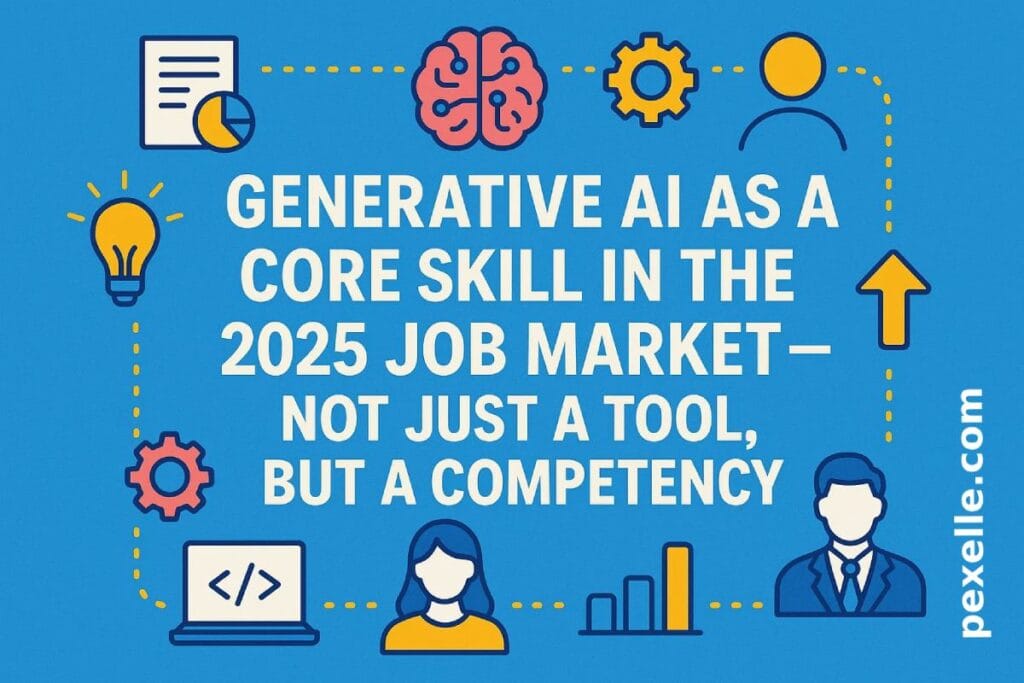Generative AI as a Core Skill in the 2025 Job Market — Not Just a Tool, but a Competency

1. The Shift: From Tool Adoption to Skill Expectation
For years, AI was considered a specialized field — something only data scientists or ML engineers needed.
But 2025 marks a turning point: Generative AI (GenAI) has become a baseline skill across industries.
Why? Because GenAI no longer demands deep programming knowledge.
It demands the ability to think, prompt, evaluate, and iterate.
This means GenAI has moved from technical specialty to workforce literacy — like email, Word, or spreadsheets once did.
The blunt truth: If you can’t work with GenAI, you are already slower than someone who can.
2. Why GenAI Is Now a Skill, Not Just a Technology
GenAI isn’t valuable for what it does — it’s valuable for how it extends human capability:
| Human Function | GenAI Enhancement | Resulting Skill |
|---|---|---|
| Thinking | Structured prompting | Problem framing |
| Creating | Rapid content generation | Concept expansion & synthesis |
| Decision-making | Scenario modeling | Strategic analysis |
| Learning | Instant knowledge access | Hyper-adaptive skill growth |
So the actual skill isn’t “using GPT” — it’s knowing how to collaborate with intelligence systems.
That requires:
- Critical thinking
- Precision language
- Context understanding
- Ethical awareness
If you lack these, AI only makes your mistakes faster.
3. The New Skill Set: AI-Augmented Work Literacy
In 2025, the most valuable professionals aren’t:
- The fastest coders
- The most charismatic communicators
- The deepest subject experts
They are the ones who can combine human and machine intelligence seamlessly.
This means the new skill stack looks like:
- Prompt Engineering for Real Outcomes
Not “write prompts.”
But designing instructions that deliver business value. - AI-Driven Research Efficiency
Knowing what to ask, how to verify, and when not to trust. - Human Oversight & Judgment
GenAI generates options.
Humans choose direction.
This choice is the skill. - Workflow Integration
Embedding GenAI into tasks, teams, and decision systems.
If you’re only consuming AI outputs, you’re replaceable.
If you’re orchestrating AI workflows, you’re not.
4. Hybrid Roles: The New Job Market Reality
GenAI doesn’t eliminate jobs — it reshapes them.
Examples of emerging hybrid roles:
| Role | Human Skill | GenAI Skill | Outcome |
|---|---|---|---|
| AI-Assisted Marketer | Storytelling | AI-driven content generation | Faster campaigns with narrative cohesion |
| AI-Integrated Product Manager | Strategy logic | Prompt-based feature prototyping | Faster product iteration |
| GenAI-Enhanced Developer | Systems thinking | Code generation supervision | More architecture, less trial-and-error |
| AI-Driven Analyst | Critical reasoning | Model-based scenario forecasting | Higher-quality insights, faster |
Notice the pattern:
The human skill sets the direction.
The AI skill accelerates execution.
People who can combine both win.
People who rely on only one lose.
5. Education Is Behind — Self-Learning Is Mandatory
Universities are still teaching outdated curricula.
Most corporate training programs are surface-level fluff.
So if you’re waiting for someone to “teach you AI” — you’ve already lost time.
In 2025:
- Learning how to learn fast is more valuable than certificates.
- Building a personal AI workflow library is more valuable than degrees.
- Navigation > knowledge.
The person who knows where to find answers beats the one who memorizes them.
The market is rewarding self-directed learners, not passive students.
6. The Pexelle Angle: Micro-Skills and Skill Proof
Here’s where platforms like Pexelle can differentiate:
Instead of teaching “AI” as a broad subject, break it into micro-competencies like:
- How to validate AI-generated claims
- How to refine prompts for specificity
- How to structure iterative reasoning loops
- How to use AI to reverse-engineer expert answers
These are practical, observable behaviors — not theory.
They can be measured, certified, and showcased in a skill portfolio.
This is the only meaningful signal in a world where everyone has online certificates.
7. The Conclusion (No Sugarcoating)
Generative AI is not a bonus skill.
It is not something “nice to learn when you have time.”
It is not optional.
It is:
- A core cognitive amplifier
- A professional equalizer
- And a career survival skill
If you’re good at your job but can’t work with AI, you will lose to someone who can.
If you’re average but can collaborate with AI intelligently, you will outperform experts.
This is the real game.
And it has already started.
Source : Medium.com




